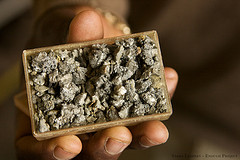Proposed EU Conflict Minerals Legislation Fails to Meet Human Rights Expectations
On March 4th, after much anticipation, the European Union Commission proposed regulation for responsible minerals trading from conflict zones. While the EU deserves praise for taking definitive action on the issue, the recommended regulation has left campaigners and stakeholders underwhelmed. Advocates and experts say that without significant improvements, the regulation could fail to curb the human rights abuses it was designed to address.
The regulation would create a voluntary due diligence self-certification scheme for EU importers of tin, tantalum, tungsten and gold (3TG), in line with the OECD Due Diligence Guidance for importers of 3TG processed metals and unprocessed ores into EU countries. If implemented, this regulation would establish an opt-in ‘responsible importer’ certification system for importers of raw ore and metals who voluntary comply with the process. The proposal outlines a number of incentives to encourage self-certification, including increased access to public procurement contracts.
Despite these incentives, advocates say that a voluntary system that is not legally binding will fail to conclusively prevent the import of conflict minerals into EU countries. According to Judith Sargentini, the Green MEP and European parliament rapporteur on the file,
“Four years after Dodd-Frank, the European commission is presenting us with a neatly gift-wrapped, empty box that will not help the Congolese people set up a sustainable mining industry, does not demand transparent trading by European companies, and leaves them instead to obey an unbalanced piece of American legislation.”
NGO stakeholders have voiced dissatisfaction with the limited scope of the regulation. In contrast to the U.S.’s Dodd-Frank 1502 conflict minerals provision, the EU regulation omits key downstream players by focusing only on importers of raw ores and metals rather than manufacturers and companies that import finished products. In addition, the regulation suggests due diligence certification for only the 3TG supply chain, which excludes other minerals traded in a variety of conflict areas.
The EU proposed regulation, accompanied by a detailed ‘communication’, also fails to satisfy a request by companies to clearly define the criteria for identifying regions as “conflict-affected and high-risk.” The proposal similarly ignored repeated calls to action by both civil society groups and the EU Parliament who recommended firm and explicit requirements for companies to undertake risk-based supply chain due diligence.
The proposed regulation is not expected to be voted on by EU Parliament until later this year, which provides opportunity for stakeholder input and advocacy. The Responsible Sourcing Network plans to coordinate consensus edits to the draft with its MSG Policy Working Group. The aim is to have the EU legislation and Dodd-Frank 1502 harmonized so together they will definitively end the trade of conflict minerals from the Great Lakes Region near eastern Congo.

